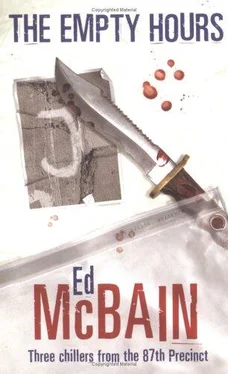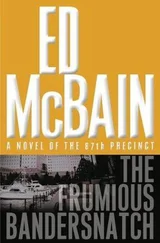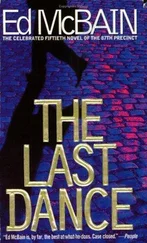Ed McBain - The Empty Hours
Здесь есть возможность читать онлайн «Ed McBain - The Empty Hours» весь текст электронной книги совершенно бесплатно (целиком полную версию без сокращений). В некоторых случаях можно слушать аудио, скачать через торрент в формате fb2 и присутствует краткое содержание. Жанр: Политический детектив, на английском языке. Описание произведения, (предисловие) а так же отзывы посетителей доступны на портале библиотеки ЛибКат.
- Название:The Empty Hours
- Автор:
- Жанр:
- Год:неизвестен
- ISBN:нет данных
- Рейтинг книги:3 / 5. Голосов: 1
-
Избранное:Добавить в избранное
- Отзывы:
-
Ваша оценка:
- 60
- 1
- 2
- 3
- 4
- 5
The Empty Hours: краткое содержание, описание и аннотация
Предлагаем к чтению аннотацию, описание, краткое содержание или предисловие (зависит от того, что написал сам автор книги «The Empty Hours»). Если вы не нашли необходимую информацию о книге — напишите в комментариях, мы постараемся отыскать её.
The Empty Hours — читать онлайн бесплатно полную книгу (весь текст) целиком
Ниже представлен текст книги, разбитый по страницам. Система сохранения места последней прочитанной страницы, позволяет с удобством читать онлайн бесплатно книгу «The Empty Hours», без необходимости каждый раз заново искать на чём Вы остановились. Поставьте закладку, и сможете в любой момент перейти на страницу, на которой закончили чтение.
Интервал:
Закладка:
“Never mind,” Hawes said. “Forget it. Did this person say anything to Helga?”
“Not a word.”
“Did she say anything to him?”
“Nothing we could hear. The wind was blowing pretty fierce.”
“But you heard her when she said hello to you.”
“That’s right.”
“Then if she’d said anything to this person, you might have heard that, too.”
“That’s right. We didn’t hear nothing.”
“You said he was carrying poles. Did you notice anything unusual about the poles?”
“Seemed like ordinary poles to me,” Jake said.
“Did both poles have baskets?”
Jake shrugged. “I didn’t notice. Did you, Obey?”
“Both seemed to have baskets,” Obadiah said. “Who’d notice a thing like that?”
“Well, you might have,” Hawes said. “If there’d been anything unusual, you might have noticed.”
“I didn’t notice nothing unusual,” Obadiah said. “Except I thought to myself this feller must be pretty cold.”
“Why?”
“Well, the hood pulled up over his head, and the scarf wrapped almost clear around his face.”
“What scarf? You didn’t mention that before.”
“Sure. He was wearing a red scarf. Covered his mouth and his nose, reached right up to the sunglasses.”
“Hmmm,” Hawes said, and the table went still.
“You’re the fellow dropped his poles on the way up, ain’t you?” Jake asked.
“Yes.”
“Thought I remembered you.”
“If you remember me, how come you can’t remember the person who took the chair alongside Helga?”
“You saying I should, mister?”
“I’m only asking.”
“Well, like maybe if I seen a guy wearing black pants and a black hood, and sunglasses, and a scarf wrapped clear around his face, why maybe then I would recognize him. But, the way I figure it, he ain’t likely to be wearing the same clothes right now, is he?”
“I don’t suppose so,” Hawes said, sighing.
“Yeah, neither do I,” Jake answered. “And I ain’t even a cop.”
9
Dusk was settling upon the mountain.
It spread into the sky and stained the snow a purple-red. The storm was beginning to taper off, the clouds vanishing before the final triumphant breakthrough of the setting sun. There was an unimaginable hush to the mountain, and the town, and the valley beyond, a hush broken only by the sound of gently jingling skid-chains on hard-packed snow.
He had found Blanche and taken her to the fireplace in the inn, settling her there with a brace of double Scotches and a half-dozen copies of a skiing magazine. Now, with the mountain and the town still, the lifts inoperative, the distant snow brushed with dying color, he started climbing the mountain. He worked through the deep snow directly under the lift, the chairs hanging motionless over his head. He was wearing ski pants and after-ski boots designed for lounging beside a fire. He had forsaken his light parka for two sweaters. Before he’d left the room, he had unholstered the .38 and slipped it into the elastic-reinforced waistband of his trousers. He could feel it digging into his abdomen now as he climbed.
The climb was not an easy one.
The snow under the lift had not been packed, and he struggled against it as he climbed, encountering drifts which were impassable, working his way in a zigzagging manner across the lift line, sometimes being forced to leave the high snow for the Cat-packed trail to the right of the lift. The light was waning. He did not know how much longer it would last. He had taken a flashlight from the glove compartment of his car, but he began to wonder whether its glow would illuminate very much once the sun had set. He began to wonder, too, exactly what he hoped to find. He was almost certain that any tracks the killer had left would already have been covered by the drifting snow. Again he cursed Theodore Watt and his inefficient slobs. Someone should have made this climb immediately after they discovered the dead girl, while there was still a possibility of finding a trail.
He continued climbing. After a day of skiing, he was physically and mentally exhausted, his muscles protesting, his eyes burning. He thumbed on the flashlight as darkness claimed the mountain, and pushed his way through knee-deep snow. He stumbled and got to his feet again. The snow had tapered almost completely, but the wind had returned with early evening, a high keening wind that rushed through the trees on either side of the lift line, pushing the clouds from the sky. There was a thin sliver of moon and a scattering of stars. The clouds raced past them like silent dark horsemen, and everywhere on the mountain was the piercing shriek of the wind, a thin scream that penetrated to the marrow.
He fell again.
Loose snow caught under the neck of his sweater, slid down his back. He shivered and tried to brush it away, got to his feet, and doggedly began climbing again. His after-ski boots had not been designed for deep snow. The tops ended just above his ankles, offering no protection whatever. He realized abruptly that the boots were already packed with snow, that his feet were literally encased in snow. He was beginning to regret this whole foolhardy mission, when he saw it.
He had come perhaps a third of the way up the lift line, the mountain in absolute darkness now, still except for the maiden scream of the wind. The flashlight played a small circle of light on the snow ahead of him as he stumbled upward, the climb more difficult now, the clouds rushing by overhead, skirting the thin moon. The light touched something which glinted momentarily, passed on as he continued climbing, stopped. He swung the flashlight back. Whatever had glinted was no longer there. Swearing, he swung the flashlight in a slow steady arc. The glint again. He swung the light back.
The basket was half-covered by the snow. Only one edge of its metallic ring showed in the beam of his light. It had probably been covered completely earlier in the day, but the strong fresh wind had exposed it to view again, and he stooped quickly to pick it up, almost as if he were afraid it would vanish. He was still bending, studying the basket in the light of the flash, when the man jumped onto his back.
The attack came suddenly and swiftly. He had heard nothing but the wind. He had been so occupied with his find, so intent on studying the basket which, he was certain, had come from the end of the ski-pole weapon, and when he felt the sudden weight on his back he did not connect it immediately with an attack. He was simply surprised, and his first thought was that one of the pines had dropped a heavy load of snow from its laden branches, and then he realized this was no heavy load of snow, but by that time he was flat on his belly.
He rolled over instantly. He held the ski pole basket in his left hand, refusing to let go of it. In his right hand, he held the flashlight, and he swung that instantly at the man’s head, felt it hitting the man’s forearm instead. Something solid struck Hawes’ shoulder; a wrench? a hammer? and he realized at once that the man was armed, and suddenly the situation became serious. He threw away the flashlight and groped for the .38 in his waistband.
The clouds cleared the moon. The figure kneeling over him, straddling him, was wearing a black parka, the hood pulled up over his head. A red scarf was wrapped over his chin and his mouth and his nose. He was holding a hammer in his right hand, and he raised the hammer over his head just as the moon disappeared again. Hawes’ fingers closed on the butt of the .38. The hammer descended.
It descended in darkness, striking Hawes on his cheek, ripping the flesh, glancing downward and catching his shoulder. Hawes swore violently, drew the .38 in a ridiculously clumsy draw, brought it into firing position, and felt again the driving blow of the other man’s weapon, the hammer lashing out of the darkness, slamming with brute force against his wrist, almost cracking the bone. His fingers opened involuntarily. The gun dropped into the snow. He bellowed in pain and tried to kick out at his attacker, but the man moved away quickly, gained his feet, and braced himself in the deep snow for the final assault. The moon appeared again. A thin silvery light put the man in silhouette against the sky, the black hooded head, the face masked by the scarf. The hammer went up over his head.
Читать дальшеИнтервал:
Закладка:
Похожие книги на «The Empty Hours»
Представляем Вашему вниманию похожие книги на «The Empty Hours» списком для выбора. Мы отобрали схожую по названию и смыслу литературу в надежде предоставить читателям больше вариантов отыскать новые, интересные, ещё непрочитанные произведения.
Обсуждение, отзывы о книге «The Empty Hours» и просто собственные мнения читателей. Оставьте ваши комментарии, напишите, что Вы думаете о произведении, его смысле или главных героях. Укажите что конкретно понравилось, а что нет, и почему Вы так считаете.












